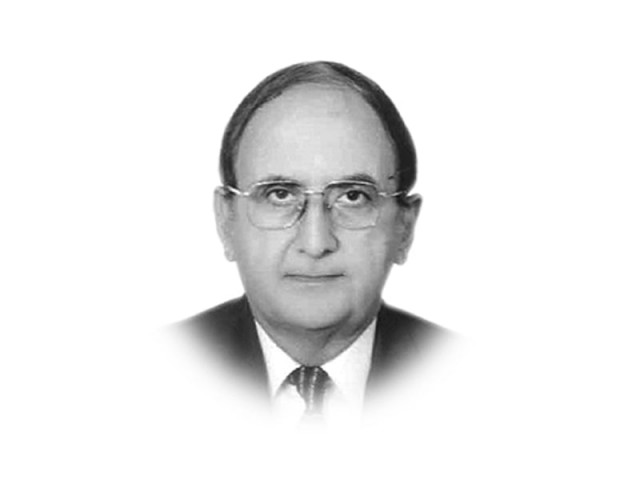Insecure democracy
The common person’s alienation from non-performing elected political leaders has made democracy insecure in Pakistan

The writer is an independent political and defence analyst. He is also the author of several books, monographs and articles on Pakistan and South Asian affairs
This alienation is in sharp contrast to the pro-democracy disposition of the politically aware and active population in 2007-08. By 2007, the civilianised military regime of General (retd) Pervez Musharraf had run aground in terms of governance and political management. General (retd) Musharraf’s political blunders, like the attempt to remove the Chief Justice of Pakistan (March 2007), securing his re-election in October 2007 and, above all, the imposition of the state of emergency on November 3, 2007, shocked the legal community, political parties and other activists. They launched a major protest in support of constitutional and civilian rule, civil, political and economic rights, and participatory governance. There was much optimism about the future of democracy in Pakistan when the elected PPP government assumed power at the federal level in March 2008.
The current disenchantment with elected civilian rule represents a typical dilemma of societies where democratic aspirations repeatedly get frustrated by the poor performance of political leadership. The rulers view their electoral mandate as a licence to advance their self-articulated agendas rather than for addressing the issues that hurt the common person in daily life. Another problem common with such rulers is that they create a personalised and patrimonial governance system, where loyalty is valued more than professionalism and merit.
Pakistan is currently experiencing a dichotomy between the theory of democracy and its operationalisation in terms of governance and political management. Every political leader talks about constitutionalism and democracy. However, once a leader assumes power through an electoral victory, he wants to run the state like a personal fiefdom and does not accommodate those questioning his rule. The other worst-case situation in a democratic system is that a political leader refuses to accept an outcome if democracy delivers a result that is not to his satisfaction. In the first case, we face the tyranny of the majority and in the second case, the political leader decides to oppose the government on every issue and settles differences with it through street agitation.
The political problems in Pakistan relate to the operational side of democracy. There is a serious problem of translating democratic aspirations and principles into concrete policy measures in order to strengthen trust between the ordinary people and the democratic political process. Elections do provide electoral legitimacy to the party in power. However, it is important that the electoral process is generally viewed as fair, free and transparent by most political contestants. If there are serious questions about the credibility of elections, these cannot ensure electoral legitimacy. The widely shared doubts about the credibility of the elections need to be addressed in a judicious manner rather than evading the issue or dismissing it as propaganda. Even if the elections are generally viewed as fair, free and transparent by a large number of political contestants, these do not give a free hand to the ruling party to govern the way it likes till the next scheduled elections.
If an elected government wants to hold on to power for its full tenure, it must ensure that its electoral legitimacy is supplemented by performance legitimacy. The success of the government depends on its performance in office rather than on how much support it enjoys in parliament. The performance of a government is judged on the basis of its concrete policies and administrative measures that ensure physical as well as socio-economic security of the common people. People in general must perceive the government as helpful in addressing their socio-economic problems and personal security issues. Furthermore, the government must ensure transparency in official financial deals and also when it comes to the use of state patronage. The key personalities of the government should not be tainted with major corruption and nepotism scandals and it must be ensured that there is no conflict between the imperatives of state policies and the business and personal interests of those exercising state power.
Pakistan’s federal and provincial governments falter on the performance criteria when it comes to socio-economic development, internal security and transparency, and professionalism. The federal government has found it difficult to cope with the challenges in the civilian domains and has drifted from crisis to crisis. It also has wrong priorities for development work by opting for publicity-oriented construction, road-building and transport projects, and distribution of laptops and loans from banks in dubious schemes ostensibly to help the people. Instead, these resources should have been used to address major economic problems, like the shortages of electricity, gas and petrol, price hike of essential commodities, lack of attention paid to education and healthcare, etc. Another problem pertains to the misuse of state resources and money-making by the power elite.
The non-satisfactory handling of these affairs has alienated the common people from the current elected civilian governance system. With the exception of the direct beneficiaries of this faltering democratic government, dissatisfaction with the existing political arrangements abounds. As the civilian government is unable to adopt a forthright approach towards internal security matters, especially when it comes to dealing with terrorist and extremist groups, the army has grabbed the initiative. This is in addition to its active role in the handling of external security and foreign policy issues. Now the army authorities are prodding the federal and provincial governments to deal effectively with the civilian side of countering terrorism.
The common person’s alienation from and anger against non-performing elected political leaders has made democracy insecure in Pakistan.
Published in The Express Tribune, January 26th, 2015.
Like Opinion & Editorial on Facebook, follow @ETOpEd on Twitter to receive all updates on all our daily pieces.
















COMMENTS
Comments are moderated and generally will be posted if they are on-topic and not abusive.
For more information, please see our Comments FAQ